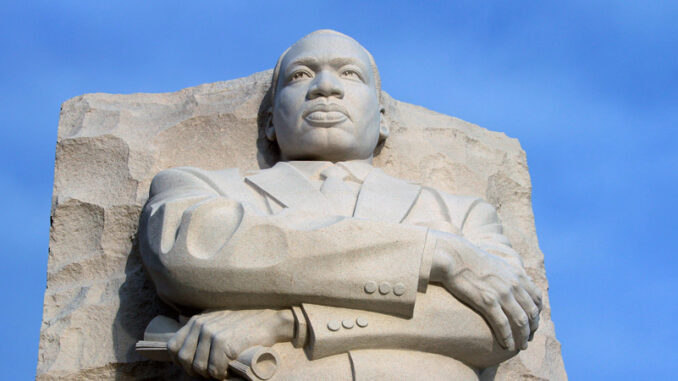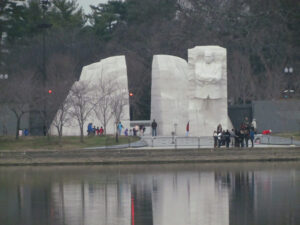

Martin Luther King, Jr. was a key leader in the civil rights movement in the 1950s and 1960s. He grew up in Atlanta, Georgia. Both his father and his mother’s father were Baptist ministers. When King became a minister, he used his position to fight racial inequality and inspire African Americans. He was a powerful speaker who believed in nonviolent resistance—the peaceful protest of unfair laws. He organized marches, boycotts, and demonstrations that opened many people’s eyes to the need for change.
National Impact
In 1956, King played a key role in organizing the Montgomery bus boycott. The success of the boycott helped propel him to national prominence. He wrote his first book in 1958. Stride Toward Freedom: The Montgomery Story explained his ideas about the role of nonviolence in protests. He spent the next 12 years working with local communities, activists, political leaders, and presidents in his effort to move the country toward equal rights for all citizens.
In March, 1965, Dr. King and many other civil rights activists and supporters led two marches in Selma, Alabama to raise awareness for voting rights in the segregated Southern states. Dr. King became famous nationally for the march on Washington D.C. that he and other civil rights leaders organized, to support a civil rights bill. On August 28, 1963, Dr. King delivered a powerful speech outlining his dream of freedom and equality. He combined ideas drawn from the Bible, the Declaration of Independence, and the experiences of African Americans to demand justice in the face of racism.
Assassination
In April 1968, Dr. King was in Memphis, Tennessee, to support a strike of African American sanitation workers. He was also planning a national campaign to call for economic gains for the poor. On April 4, as he stood on a hotel balcony, King was assassinated by a sniper. His murder shocked the nation. Protests occurred in more than 100 cities after his death. His funeral, held in Atlanta, Georgia, was attended by thousands and watched by millions on television.
Legacy
Dr. King’s death did not end the civil rights movement. Under his leadership, and with the help of tens of thousands of dedicated people, the civil rights movement had transformed American society. King had established a pattern of nonviolent protest that endures today. He had also called on Americans to lay down their lives in service to their communities and to each other, believing that service was the path to true greatness.
It took many years of negotiating before leaders could agree on a federal holiday to honor Martin Luther King, Jr. Legislation was first introduced on April 8, 1968, only four days after King’s assassination. In 1983, the law finally was passed by a 338-90 vote in the House and a 78-22 vote in the Senate. It was signed by President Ronald Reagan. The federal holiday was observed for the first time in 1986.
It would be 20 years before all 50 states acknowledged the holiday. In 2006, South Carolina was the last state to sign legislation marking the day as a state holiday. Martin Luther King, Jr. Day is celebrated by many as a national day of service to their communities, modeled after the pattern of King’s service to our country.
